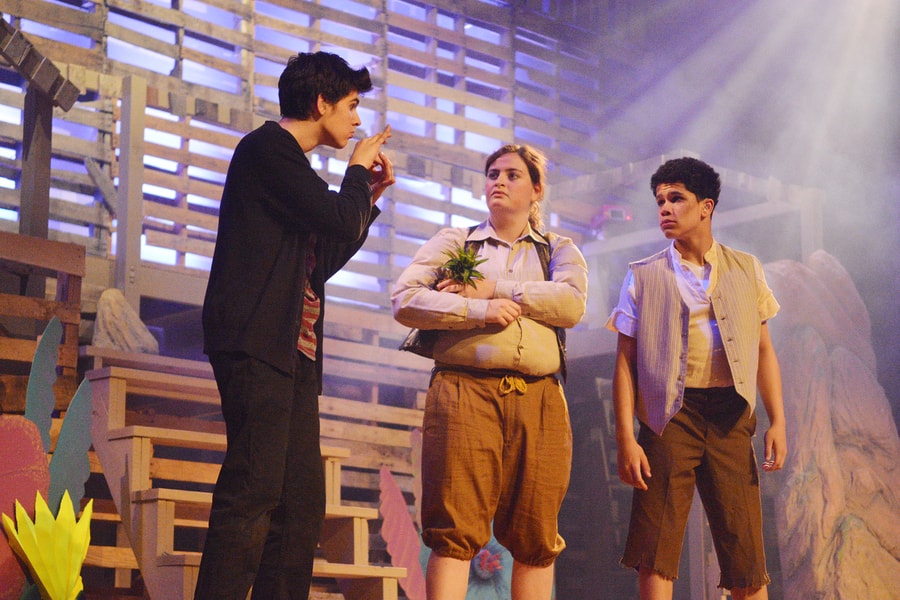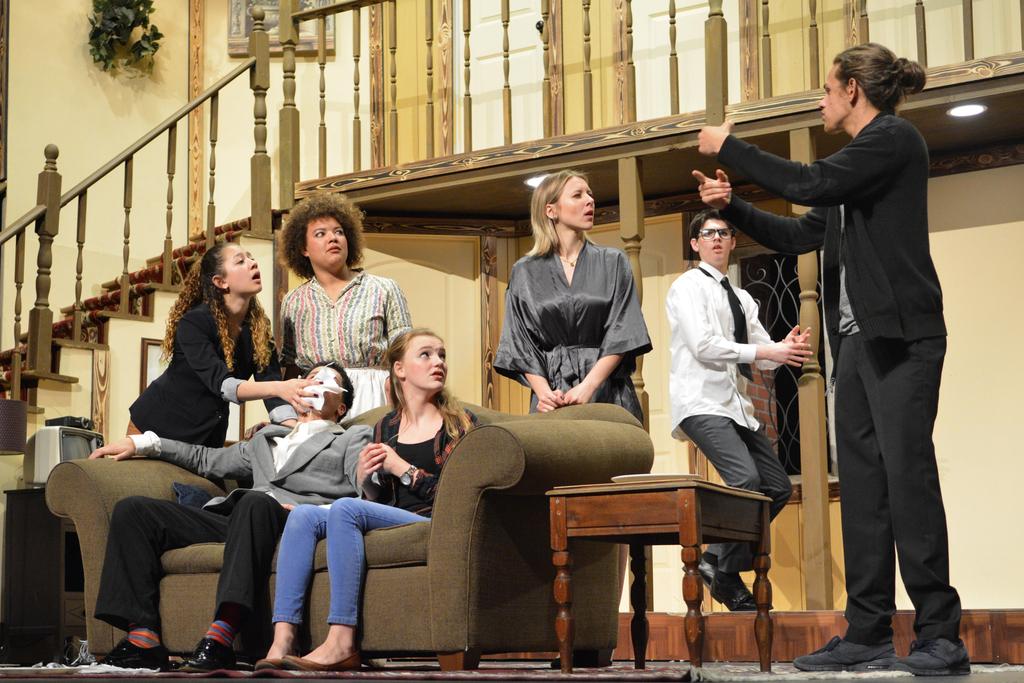This article may strike some nerves and spark some disagreement, but I feel this needs to be said in order to raise awareness regarding a few issues pertaining to theatre education and the Deaf community. As the performing arts program coordinator and high school theatre teacher at Texas School for the Deaf, one of the largest Deaf residential schools in the United States, I am often contacted by theatre teachers/directors from schools all across the state seeking my advice or support, or to collaborate or publicize their shows.

Before we go into what I am about to preach to you on, let me tell you more about my background. In addition to my job at the Deaf school, I am also the founding artistic director for a Deaf theatre company. I graduated from Gallaudet University, an internationally known Deaf university in Washington, D.C., and am currently finishing my doctorate in Deaf studies & Deaf education. And yes, I am Deaf.
Every school year, my inbox is flooded with emails from schools all over my state, about the following subjects:
- Productions with Deaf characters
- Productions where they incorporate ASL
- Productions with ASL interpreting
These emails all sing variations on the same showtune…
- “Hi, my school is doing a show with Deaf characters and the whole cast has been working really hard to learn sign language…”
- “We have been working on a show all year and have taught everyone in the cast ASL in order to perform the show in both English and ASL simultaneously…”
- “We are doing a show with Deaf characters and want to bring it to your school to perform for your students…”
- “We are considering doing a show but want to know how to do it with incorporating ASL. Would you be interested in coming to consult on this?”
- “We are providing ASL interpreting, provided by our school’s ASL students, and want to invite your students to see our show…”
The list goes on.
Every time I get one of these emails, I cringe and put it aside for a few days before I can provide a professional reply. I have to remind myself that they…just…don’t…understand.

While I get that they want to expose their students to ASL, and this all comes from a place of good intentions but also a place of ignorance, these emails are tiresome for a Deaf person. I have to educate folks again and again, then defend why I suggest what I suggest when they argue back at me. It has gotten to the point where I have a reply drafted and saved on my laptop that I use in response to these emails, which I edit slightly to fit each inquiry.
Here is the sage advice I bestow upon those brave enough to email me. Please know that I am writing this from a place of love and support, in hopes of giving guidance for theatre educators and producers nationwide. While I wrote this to focus on theatre education in schools, these tips do apply to the entertainment industry in general, so you can substitute the word student for person, actor, or artist.
1. Any time your script has a Deaf character, do not cast a hearing student in the role and attempt to teach them sign language. These roles are written for Deaf people, so you should contact your school district to see if there are any Deaf students that might be interested in joining the show and taking on that role. We Deaf artists are constantly fighting for our right to play roles written for us. Producers and directors often select hearing artists instead so they do not have to deal with the communication barrier.
Here is the deal: A hearing person can never portray a Deaf person with real authenticity. Never. They can never understand what it is like to be oppressed because you are Deaf, thought to be uneducated, labeled insane and placed in mental hospitals, labeled “Deaf and Dumb,” have your hands tied down in order to teach you lip reading and speech to force you to be “normal,” or to be constantly passed over for jobs that you are more than qualified for, only to see the job go to someone less qualified but hearing. Yes, all of these things have happened to Deaf people in our country. Yes, some of them are still happening. Deaf roles should be played by Deaf people, period.
2. While I appreciate that you want to share your student’s hard work learning sign language with my students, we are not interested in coming to see new signers butcher our language. It takes about four to five years of consistent study and immersion to become conversationally fluent in ASL. So watching your students sign is torturous, because they are never conceptually accurate, nor are they clearly understandable. The Deaf community is always appreciative when people decide to learn sign language, because it opens the lines of communication. But when you use our language as a gimmick to attract audiences and sell more tickets for your shows, we are going to have a problem. It is the theatrical equivalent of “inspiration porn.” We do not want it.
Incorporating ASL into a theatrical work requires authenticity. There has to be a reason why you have decided to do the show in ASL and English. Basically, there should be Deaf actors in the show. Do not just do a bilingual show with ASL and English without there being a Deaf performer involved. Indeed, if you want to do a bilingual show, why not double-cast the show with both Deaf and hearing students in all of the roles? (No, ASL students are not qualified to play those roles.)
3. Speaking of ASL students: No, they are not qualified to interpret shows. Knowing ASL and interpreting are two completely different things. Remember how I mentioned above that it takes four to five years to be conversationally fluent? Well, it takes a good six to seven years to develop the interpreting skills to take an auditory language (in this case spoken English) and translate it into a visual language. Interpreting theatre is even harder, because you also have to add in emotion and characterization, and ensure that important visual information is conveyed to the audience, while not distracting from the production itself. Most certified ASL interpreters shy away from theatre interpreting work because it is so taxing.
So again, your ASL III students will not suffice. While you think you are providing access for your show, you really are not. You are providing inappropriate, inadequate access that will ruin the Deaf theatregoer’s experience. If you want to provide true access to your show, hire certified ASL interpreters who are skilled at interpreting theatre.
4. When choosing shows to do with Deaf students or actors, you are not limited to shows already written with Deaf characters, like Children of a Lesser God and Tribes. These shows have been done to death. You can do any play or musical, and just make characters Deaf. When you do this, you will need to insert some authenticity into the production to make it believable. Do not just make one character Deaf who is somehow able to understand the spoken language of everyone else while they use sign language. Incorporate subtle elements, such as a flashing doorbell or a videophone instead of a ringing phone or door chime. You can even add tension between the Deaf character and the hearing characters due to language access and the communication struggle. These subtle additions will make the show more authentic.
Now let me give you some solutions for the issues above:
- Contact your school district and see if there is a Deaf program where you can cast Deaf kids in roles written for Deaf actors. If you cannot find any, then do not do that show. Pick a different show.
- If you are able to find a Deaf student, make sure that they have full access to all communication during the production. This means hiring an interpreter for all rehearsals and performances.
- Enlist the support of a member of the Deaf community to help incorporate some Deaf cultural aspects into the show for authenticity.
- If you want to provide access to your show for the Deaf community, then hire qualified, certified ASL interpreters. Do this well in advance so that the interpreters have the time to prepare, instead of booking them last minute. Contact your local interpreting agency for support with this.
When I receive emails like the ones above, I keep my cool and try to educate them on the appropriate practices for incorporating ASL and Deaf characters, and I explain why some things are offensive to our community. Most of the time they never respond back. Perhaps it is because I just dashed their dreams, or maybe they disagree with me and opt to go ahead with their production anyway. I don’t know.
Sometimes they do respond, only to argue with me or defend their decisions. Listen: When you reach out to the subject matter experts for their advice or opinion, be prepared that they might say something you do not want to hear. The important thing is that you listen to what they say. They are the experts for a reason, and that is why you contacted them in the first place.
As we say in the Deaf theatre community: Break fingers!
Brian Andrew Cheslik (he/him) currently holds a Master in Deaf Studies & Deaf Education, and will be completing his Ph.D. in the same field this year. In addition to running the theatre program at Texas School for the Deaf, he is also the artistic director for Deaf Austin Theatre.




